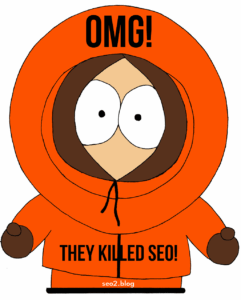
How do you optimize websites for people? I mean actual readers!
Especially those who are suffering from chronic attention shortage?
You need to make websites
- findable
- intriguing
- readable
- engaging
- usable
- popular
In short it’s “fire up” or FIRE UP as an acronym.
“fire someone up – Fig. to motivate someone; to make someone enthusiastic.”
What to do when people do not read at all, not online and not on paper?
A shocking reading statistic from US libraries says: around one fifth of Americans don’t read books at all.
Online reading habits – there are none
Yes, people on the Web don’t read either.
They mostly scan pages and read just a few words here and there if they click the headline at all.
8 out of 10 people do not even go beyond the headline and bounce immediately in the worst case.
Many return to search results to click something else.
Google even counts the number of people who hit the back button.
The same applies to those who do not even click after viewing search results.
Your site gets demoted based on that user and interaction data.
My shameful past
Let me confess: I didn’t read books until I was 16. No joke!
I didn’t even read newspapers or magazines until I was 14.
We didn’t have the Internet or mobile phones back then so I wasn’t reading websites or SMS either!
To make things worse my mother was a linguist focused on teaching language and editing literature.
These days I roughly read a 500+ pages book a week. Sometimes I read two or three books at once.
A miraculous transformation
How did that miraculous transformation happen?
My case seemed to be hopeless like with the rest of this miserable one fifth of the population.
Why didn’t I read at all as a teen? It wasn’t that I couldn’t read.
I could read in three languages by the age of 14 (Polish, German, English).
Yet I didn’t want to read. I didn’t think books were attractive enough for me.
I didn’t appreciate books and I didn’t think reading could enrich my daily life.
It’s not a story about me here though. My point is that you can make books or reading in general
- findable
- intriguing
- readable
- engaging
- usable
- popular
so that everybody will want to read and enjoy it. You have to treat the people who don’t read like disabled people.
It just happens that roughly the same number of people is also really disabled, almost 1/5 fifth in the US and the UK.
People who don’t read lack a basic human experience.
They don’t have access to a whole universe of knowledge.
It’s our task to enable these literally disabled people to read again or at all.
Librarians seem to have given up on them already.
With websites and mobile phones being used by almost everybody it’s far easier to get people to read.
How to make people read in these times? You just need to make your site:
findable
You have to ensure the findability of your content – be it text or mixed content (text and images) or solely images.
Even images without text can make people read. Image captions are a good start.
How did I finally start reading?
When I was 14 my mother pointed out an article to me about my favorite sweets in the weekly magazine my father had subscribed to for years.
I have looked at the magazine covers for ages but didn’t even read when they featured barely clad women.
The mags always lay around the living room. Thus my mother only needed to point it out casually. She didn’t have to get up, search for it and peruse dozens of other magazines to find it.
Nowadays it’s not as easy to be around where the hard to reach audience stays.
One day it’s Facebook, next day it’s Instagram, third day it’s Snapchat.
Don’t just stay in your ivory tower or library and claim that everybody has to come visit you. Spend some time on outreach efforts.
You can publish quotes from your favorite authors on social media. Indeed on sites like
- Tumblr
- X/Twitter
aphorisms work best!
Don’t just optimize for Google. Work on your internal search. Tag your content.
Make sure your images and quotes can be found on Pinterest or Twitter.

intriguing
Now you agree that just staying where you are and waiting passively may not be enough.
You will probably wonder how to make people who never read become interested in what you want to see or rather read then.
One of the most likely candidates for your help are dyslexic people. These people are really disabled in that they can’t read fluently.
People who can’t read or comprehend fast need books or graphic novels or other forms of text that don’t require huge chunks of text.
Song lyrics or even poems can be a good starting point! They have to pick them up where they are though.
The Beat Generation may be a good start for young people or those who have failed to reach their full potential like many non-readers probably have.
Another typical non-reader is what I’d like to call the “tough guy” who is “too cool to read”.
“Real men” sometimes believe that reading is somehow compromising their manliness.
Survival or bodybuilding resources probably won’t hurt.
You need to intrigue them. Don’t just attempt to make people read what you think they should. Give them what they want in print or online form.
Even clickbait can help. Don’t give away everything in the headline.

Consider this example: “Ursula K- Le Guin, famed writer, dies at 88”.
Why would I click that link? I already know why she was famous and how old she was when she died.
Also I know that she’s dead in the first place. So why bother? I know everything there is to know. Isn’t it?
How about “The #1 reason why Ursula K. Le Guin will be remembered” instead?
To find out you can click through actually read that article!
We are intrigued. We wonder: is she already dead?
What did she do that made her so memorable? We want to know!
readable

Readability is a huge problem with both books and websites alike.
In these times our attention spans are extremely short.
Small screens on mobile devices make reading even more difficult.
We can’t focus on longer paragraphs or even sentences anymore.
This is also an issue with truly disabled people. They may have cognitive deficits.
I have cognitive deficits myself when I’m tired or when I experience pain from migraine attacks. I can’t read properly then.
Other people may be perfectly average but have difficulties when reading while on the go, holding a baby on their arm or trying to multitask in general.
Keep sentences short. Don’t complicate things to sound smart. Your website should be written for everybody.
It’s not about writing a thesis in college. It’s about reaching a wider audiences. Twitter is a good exercise.
Make your messages work in 140 characters and write like that for the rest of the Web.
Authors like Ernest Hemingway or Paul Auster have used simplicity to reach millions.
Simple word choices, short sentences and paragraphs won’t suffice though. You need to format text.
- blockquotes
- lists
- bold text
- text-marker effects
have proven to work best to enhance website readability.
engaging
There is this old social media cliche that “you have to engage in the conversation”. It’s true.
That’s like you have to write on the Web. Write in a conversational tone.
No joke! Talk to your reader. Hey reader! I’m talking to you! Yes, you are the one!
Become a buddy of your reader. Imagine sending an SMS to your ideal reader. Say “hello”!
- Ask questions in your articles, not just rhetoric ones.
- Add calls to action asking for feedback!
- Appeal to emotions by telling stories and speaking about real people like yourself or your family.
- Cover worthwhile causes.
- Don’t just promote yourself and push what you like.
- Publish what others love.
You are meant not to judge a book by it’s cover but we all do. What’s on top and gets seen first counts.
Make a good first impression by placing attractive visual content on top of your page, each page.
usable

OK, you have done everything right. Now the fire is already burning.
Your site and content are by now findable, intriguing, readable, engaging…
What’s the problem then? Your site may still fail as a whole.
It can be all of the above but when it’s not usable it’s wasted.
Usability or in modern words user experience matters on many levels.
Can everybody access and use the site?
Or is it rather built for healthy white males, speaking perfect English? Just like the WHite House site after Trump too over?
Some of these non-readers may be actually disabled – blind for example! Don’t slam the door in their face!
When you fail to provide alternative text to your images and make the page navigable using the keyboard you lose that person.
Others may be healthy and enabled at the first sight – but like me often sick and tired (no pun intended). After staring all day into the screen
- I can’t read long paragraphs anymore
- sift through huge mega menus
- or even deal with bright colors with a lot of contrast.
Don’t be overtly creative when building sites. The website is not the artwork, it’s the frame the artwork is in.
Keep it simple with low cognitive load by not reinventing the wheel.
Just place the logo on the top left, the navigation on top and the content below. Don’t add more than 6 menu items.
Cut out or limit the blinking ads and misleading “you may also like” partner stories.
popular

Even when the fire is burning and almost everybody can use your site one thing my be missing!
It’s still not enough to succeed with your website when you don’t have an audience yet!
You of course need to become popular. You can become popular in general but also in your niche or area.
Popularity can be relative. A popular restaurant in your neighborhood does not have to be McDonald’s.
Consider popularization as explaining science to larger audiences. It’s about understanding. Keep it simple!
When scientists write for each to get reviewed by their peers nobody else will really understand them.
Many bloggers and website owners write like scientists only for their colleagues. They ignore people outside their industry or beginners.
Remember to publish for average people as well.
Cover topics that matter for many people. Use language even your mother can understand without cryptic acronyms and insider lingo.
Don’t assume everybody knows what you are talking about and provide context on top.
Try to explain things in a way even kids can get!
Last but not least simplify the linking and sharing process without only focusing on third party sites.
Let people link to your site easily and share your content by mail or using messenger apps.
Allow copy and pasting! Sometimes it’s even impossible to select a headline or text quote due to bad design.
Fired up already?
Are you enthusiastic now? I certainly hope so.
Of course I tried to use the FIRE UP approach myself here.
Did it work? I have no idea! Tell me below in the comments!
Or reach out and ping me using your favorite social media channels!








